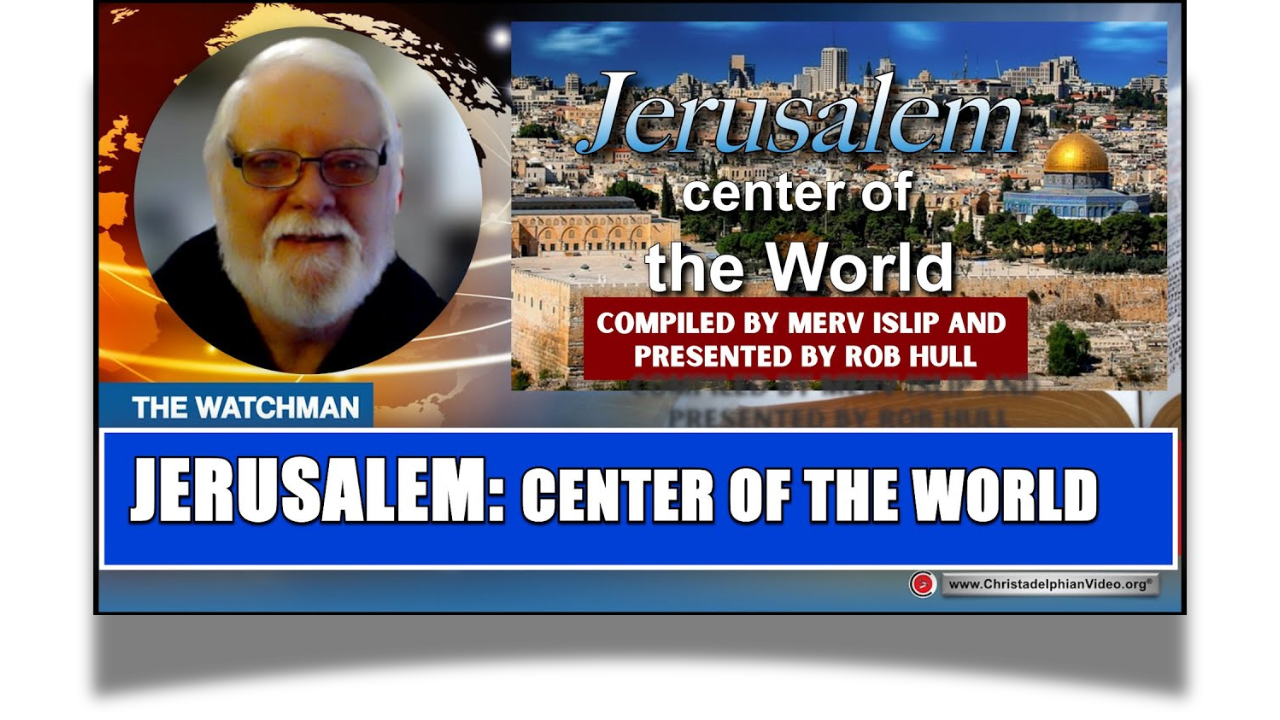
[vc_row][vc_column][vc_column_text css="" css_animation="none"]A literal, physical blueprint for the future House of Prayer that will be built in Jerusalem during the Kingdom of God (the Millennium).
1. A Literal Future Building (The Kingdom Age)
This temple will be constructed after the Battle of Armageddon and the return of Christ. It serves as the focal point for the "Kingdom Age" (the 1,000-year reign of Christ on earth).
Location: It will be situated in Israel, specifically on a transfigured Mount Zion.
Scale: The dimensions described by Ezekiel are significantly larger than Solomon's Temple or Herod's Temple. The structure is a massive, mile-square complex that will require significant changes to the current geography of Jerusalem to fit.
2. The Purpose of the Temple
The Temple is viewed as the center of global worship and government.
House of Prayer for All Nations: Quoting Isaiah 56:7 and Mark 11:17, it is the place where mortal survivors of the nations will travel annually to worship (specifically for the Feast of Tabernacles, as noted in Zechariah 14:16).
The Throne of the Lord: It is where Jesus (the King-Priest) will physically sit and rule the nations.
3. The Reinstatement of Sacrifices
Not for Salvation: These sacrifices do not take away sin or replace the saving work of Jesus (whose sacrifice was once and for all).
Memorial & Educational: Instead, they are viewed as memorials. Just as the Lord’s Supper (bread and wine) looks back to Christ's death now, these sacrifices will look back to his death in the future. They serve as a powerful object lesson for the mortal population of the earth—teaching them the seriousness of sin and the cost of holiness.
4. Geographic Changes (The Holy Oblation)
A massive earthquake (based on Zechariah 14:4) to occur when Christ returns. This will flatten parts of the land and elevate Mount Zion to create a "very high mountain" (Ezekiel 40:2) capable of supporting this massive temple complex.
The Living Waters: They interpret Ezekiel 47 literally—a river will flow from under the Temple sanctuary, heading east towards the Dead Sea. This water will heal the Dead Sea, making it fresh and teeming with fish.
5. The Role of "The Prince"
Ezekiel mentions a figure called "the Prince" who offers sacrifices.
Identification: "The Prince" is Jesus Christ.
The Offering: When the text says the Prince offers a sin offering "for himself," Generally interpret this not as Jesus having moral sin, but as him acknowledging his own nature (having been part of a sin-cursed race) and his redemption from death, or acting as the representative head of the people.
Ezekiel's Temple is the "World Trade Center" of the future—not for commerce, but for righteousness. It represents the ultimate fulfillment of God's promise to Abraham: that all nations will be blessed through his seed (Christ) in the land of Israel.
[embedyt] https://www.youtube.com/watch?v=Aw3Nngu5JP8[/embedyt]

[/vc_column_text][/vc_column][/vc_row][vc_row][vc_column][vc_column_text css="" css_animation="none"]***************************************************************************************
This video was produced by the ChristadelphianVideo.org project, arranged and supported by Christadelphians worldwide. You can follow us online at..
#1 Our Main site...


#2 Our podcast on Spotify..


#3 Our podcast on Apple.


#4 Our podcast on Podbean


#5 Our facebook...


#6 Our Whats App..


#7 Our Instagram...


#8 Our X...


#9 Our YouTube Channel...


#10 Our Audio site ...


Watch/read/Listen/ subscribe to thoughts for the day

CHRISTADELPHIANVIDEO.ORG, a worldwide collaboration by Christadelphians to help promote the understanding of God's Word to those who are seeking the Truth about the Human condition and God's plan and Purpose with the Earth and Mankind upon it.
#Christadelphianvideo #christadelphianstalk #Christadelphians #bibletruthfeed #openbible #Gospeltruth #gospel #Christadelphian #bibletruthfeed #podcast[/vc_column_text][/vc_column][/vc_row]
https://christadelphianvideo.org/studyvideo/the-future-house-of-prayer-for-all-nations-ezekiel-40-48/?feed_id=109500&_unique_id=696a091b300c7
 [vc_row][vc_column][vc_column_text css="" css_animation="none"]A literal, physical blueprint for the future House of Prayer that will be built in Jerusalem during the Kingdom of God (the Millennium).
[vc_row][vc_column][vc_column_text css="" css_animation="none"]A literal, physical blueprint for the future House of Prayer that will be built in Jerusalem during the Kingdom of God (the Millennium).
 [/vc_column_text][/vc_column][/vc_row][vc_row][vc_column][vc_column_text css="" css_animation="none"]***************************************************************************************
This video was produced by the ChristadelphianVideo.org project, arranged and supported by Christadelphians worldwide. You can follow us online at..
#1 Our Main site...
[/vc_column_text][/vc_column][/vc_row][vc_row][vc_column][vc_column_text css="" css_animation="none"]***************************************************************************************
This video was produced by the ChristadelphianVideo.org project, arranged and supported by Christadelphians worldwide. You can follow us online at..
#1 Our Main site... 
 [vc_row][vc_column][vc_column_text css="" css_animation="none"]In this Series, we aim to bring perspective to matters of current news items from a Biblical viewpoint. Whether Prophecy or Moral and Social issues, we highlight Biblical instruction relating to those breaking stories on the world stage.
A @Christadelphians Video: *[Inspiring]*
In this timely **Watchman Report**, we sound the alarm on the city destined to shape humanity's future: **Jerusalem**. While it stands as the world's most contested city today, Scripture reveals its outstanding and wonderful destiny as the future capital of the globe. Join us for a thought-provoking and insightful exposition on why Jerusalem is, and will be, the undeniable center of world government under the reign of the Lord Jesus Christ.
*Chapters:*
00:00 - Introduction: Jerusalem, The Contested City
00:51 - A Turbulent History: From David to Today
02:21 - The Stunning Biblical Promise: Jerusalem as God’s Throne
03:05 - The King & The Kingdom: Jesus Christ Enthroned in Jerusalem
03:44 - The Mountain of the Lord’s House: Isaiah’s Prophetic Vision
04:43 - Global Transformation: Education, Disarmament, and Peace
05:56 - Universal Submission: The Nations Coming to Jerusalem
06:24 - A City Made Holy: No Strangers Allowed
07:18 - The Glorious Restoration: Jerusalem Rebuilt in Joy
[embedyt] https://www.youtube.com/watch?v=OFhN_AVG09U[/embedyt]
*Key Bible Verses Explored:*
📖 Jeremiah 3:17
📖 Luke 1:32-33
📖 Isaiah 2:1-4
📖 Zechariah 14:16
📖 Joel 3:17
📖 Isaiah 24:23
📖 Isaiah 52:1
📖 Jeremiah 30:18
📖 Isaiah 65:18
Tags: Watchman Report, Jerusalem prophecy, center of the world, Bible prophecy, Kingdom of God, Jesus Christ returns, Zion, Isaiah prophecy, Middle East news, biblical perspective, end times, Christadelphian Bible study, God's throne, world government, future of Jerusalem.
We are a Christadelphian team, Brothers and sisters of Christ, and we're passionate about delivering powerful, Scripture-based content to strengthen and inspire your faith journey. If this presentation resonated with you, help spread the encouragement—share it with a friend today!
[vc_row][vc_column][vc_column_text css="" css_animation="none"]In this Series, we aim to bring perspective to matters of current news items from a Biblical viewpoint. Whether Prophecy or Moral and Social issues, we highlight Biblical instruction relating to those breaking stories on the world stage.
A @Christadelphians Video: *[Inspiring]*
In this timely **Watchman Report**, we sound the alarm on the city destined to shape humanity's future: **Jerusalem**. While it stands as the world's most contested city today, Scripture reveals its outstanding and wonderful destiny as the future capital of the globe. Join us for a thought-provoking and insightful exposition on why Jerusalem is, and will be, the undeniable center of world government under the reign of the Lord Jesus Christ.
*Chapters:*
00:00 - Introduction: Jerusalem, The Contested City
00:51 - A Turbulent History: From David to Today
02:21 - The Stunning Biblical Promise: Jerusalem as God’s Throne
03:05 - The King & The Kingdom: Jesus Christ Enthroned in Jerusalem
03:44 - The Mountain of the Lord’s House: Isaiah’s Prophetic Vision
04:43 - Global Transformation: Education, Disarmament, and Peace
05:56 - Universal Submission: The Nations Coming to Jerusalem
06:24 - A City Made Holy: No Strangers Allowed
07:18 - The Glorious Restoration: Jerusalem Rebuilt in Joy
[embedyt] https://www.youtube.com/watch?v=OFhN_AVG09U[/embedyt]
*Key Bible Verses Explored:*
📖 Jeremiah 3:17
📖 Luke 1:32-33
📖 Isaiah 2:1-4
📖 Zechariah 14:16
📖 Joel 3:17
📖 Isaiah 24:23
📖 Isaiah 52:1
📖 Jeremiah 30:18
📖 Isaiah 65:18
Tags: Watchman Report, Jerusalem prophecy, center of the world, Bible prophecy, Kingdom of God, Jesus Christ returns, Zion, Isaiah prophecy, Middle East news, biblical perspective, end times, Christadelphian Bible study, God's throne, world government, future of Jerusalem.
We are a Christadelphian team, Brothers and sisters of Christ, and we're passionate about delivering powerful, Scripture-based content to strengthen and inspire your faith journey. If this presentation resonated with you, help spread the encouragement—share it with a friend today!
 [vc_row][vc_column][vc_column_text css=""]
[vc_row][vc_column][vc_column_text css=""]



